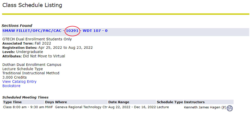Dual Enrollment Lingo
Learning the lingo or what people are talking about is an important step to succeeding in college. Too often faculty and staff assume that you know how the system works and what they mean when they are talking to you.
Don’t let terminology trip you up! Prepare yourself by understanding these commonly used college terms.

